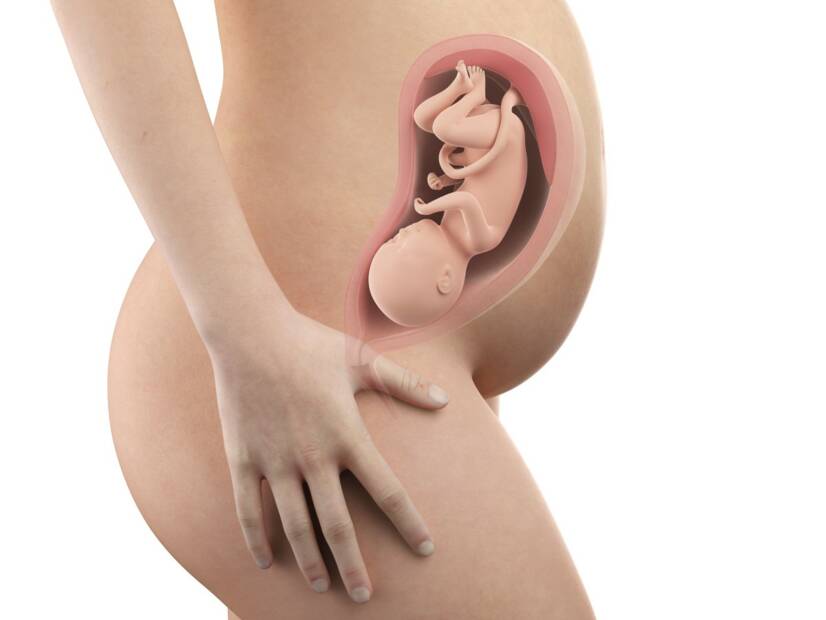- ehd.org - Biology of prenatal development
- whattoexpect.com - 33rd week of pregnancy
- bounty.com - 33 weeks of pregnancy
- nhs.uk - Week-by-week quide to pregnancy
Week 33 of pregnancy: when does the space in the uterus shrink?

Your baby's space in the womb is shrinking. There's not enough room for his acrobatic stunts.
Article content
You are 33 weeks pregnant and your due date is only 7 weeks away.
The baby is growing and gaining weight. He's curling up into a ball more as the space in the womb shrinks. The violent movements and kicking stop. If he's kicking, his kicking is quite noticeable. He's more likely just rolling around.
How is your baby developing in your tummy?
Your baby continues to store fat and gain weight. It's preparing to come into the world. In a few weeks or days, it will see the light of day.
At this week, his weight is approximately 1,920 grams and his length is 43 centimeters.
His lungs are almost mature, ready to breathe after birth.
He can distinguish light from dark. His pupils change size when stimulated by light.
The skin takes on a pink colour and fat is deposited in the subcutaneous tissue.
He has a developed brain and nervous system. He will be able to suck and swallow, although he still needs to improve. This will take about a week.
Its digestive system is fully functional. The foetus is still drinking amniotic fluid, which it then expels. It's practicing sucking and swallowing.
Your baby sleeps a lot now. Sometimes very deeply and hard, like an adult. He also kicks less at this time.
If he is awake, he listens to the sounds and voices of your surroundings.
The fetus is beginning to build up its own immunity and no longer draws immune substances only from the placenta.
The skull remains soft and flexible to allow passage through the birth canal to protect the baby's brain.
The fetus stores iron in the liver, which it will draw on after birth until the 6th month of life.
Most of the lanugo on the fetal body has already fallen out.
Vernix is a thick white layer of lubricant that is found on the skin of the fetus. A certain amount of lubricant remains until birth.
If you're expecting a boy, his testicles begin to descend.
The amount of amniotic fluid is now at its maximum. It will only decrease, which will make you feel the baby's kicks more acutely.
Remember! Your baby feels the love you give him by communicating with him and stroking him.
The table shows the approximate dimensions of the fetus at 33 weeks, as measured by sonography
| Total length | Weight | HC Head circumference | BPD Transverse head diameter | AC Abdominal circumference | FL Femur length |
| 43.7 cm | 1920 g | 301.5 mm | 85.9 mm | 283,8 mm | 61,3 mm |
For more information on fetal size, see the article:
Ultrasound in pregnancy: fetal size, what is fetal biometry?
How does a woman feel at 33 weeks?
You are no longer gaining much weight, although the fetus is still growing and gaining weight.
Towards the end of pregnancy, you are likely to experience increasing discomfort, such as indigestion, heartburn even after smaller portions of food, swelling and cramps in the lower limbs.
If you notice sudden swelling in your legs, arms or face, tell your doctor immediately.
Shortness of breath or difficulty breathing is caused by the growing uterus reaching up to the ribs and pressing on the diaphragm and lungs.
The baby's pressure and persistent constipation may aggravate your hemorrhoids or you may experience slight leakage of urine. It is recommended to practice Kegel exercises to strengthen the pelvic floor to counteract unwanted leakage of urine.
Of course, everything is individual. Every mum-to-be will go through the whole pregnancy differently. One has all the problems and another doesn't even notice that she is pregnant and slowly approaching labour.
Think about the fact that you are already at the end of your pregnancy. In a few weeks, with the birth, all the problems will disappear and you will be holding your longed-for baby in your arms. With the birth of the baby, you will forget about all the problems that accompanied your pregnancy.
You may notice an inconspicuous or sudden leakage of amniotic fluid on your underwear or leakage through your pants. In this case, visit the hospital. The amniotic fluid is clear and has a sweet smell.
Fatigue persists, especially if you also have trouble sleeping. The best and safest position for sleeping is on your side. Try to avoid sleeping on your back, as the weight of the fetus presses on your back and can cause circulatory disturbances, back pain and numbness in your legs.
Sleep problems may not only be caused by a growing baby and tummy. You may also be woken by a full bladder. In addition, you're already starting to have thoughts of giving birth and can't wait to see your baby. What will it look like, who will it resemble? Curiosity can often rob you of sleep.
The incoming messengers intensify. You no longer feel just hardening and tightening of the abdomen, but also more intense pain than during menstruation. The messengers prepare you and your uterus for birth.
They usually last for a short time, are relatively weak and do not increase in intensity. They usually pass when you change position, take a walk or rest.
The actual contractions will be regular, frequent, last longer and become more painful as labour progresses.
If they don't stop even after changing position, last about a minute, then come again after a few minutes, don't stop for a long time, go to the hospital. Get checked to see if premature labour has started.
If you're expecting twins, you should be prepared. On average, twins are born at 36-37 weeks, but they can come earlier. The longer the babies are in the womb, the better it is for them.
What can you notice?
You may feel shaky before eating or dizzy because of the increased metabolism. This is a result of the fast metabolism of sugar. You should always have a small snack on hand when your sugar drops.
You're getting impatient and a small sense of fear of childbirth is starting to set in. Don't worry, the female body can handle childbirth. Think of it as the most beautiful moment of your life, when the baby is born, you will see it and be able to hold it in your arms.
What tests to expect at 33 weeks
You should visit the clinic every two weeks from the 33rd week of pregnancy.
At the clinic, you will have regular check-ups, have your blood pressure taken, urine tested, weight gain recorded and lower limb swelling monitored. The doctor checks the growth of the uterus, monitors uterine contractions and takes a CTG - cardiotocography - to monitor the fetal heart rate and uterine contractions.
In this week, your blood count will be checked to see if you are anemic. You will be tested for the presence of antibodies to syphilis and your blood will be tested for the RH factor if the woman is Rh negative and the father is Rh positive. If the antibodies are elevated, hospitalization is required.
What if the baby is born prematurely?
Babies born at 33 weeks have a good chance of survival without subsequent complications.
Many times, after a premature newborn is born at 33 weeks, pulmonary ventilation is not necessary, only mask assisted breathing. He is placed in a heated incubator and his vital signs are monitored. Surfactant is only given to babies who have failed to produce enough during pregnancy and are beginning to develop respiratory distress syndrome.
The infant rapidly catches up in development with its peers and is monitored until the age of 5 years.
What can we recommend?
- Don't forget to get plenty of exercise, go for walks. Yoga, especially breathing techniques, is very beneficial to help with childbirth.
- Get plenty of rest during the day, don't overexert yourself, avoid lifting heavy objects.
- Practice Kegel exercises to strengthen the pelvic floor.
- Eat a healthy diet with sufficient calcium, iron, fibre and vitamins. Your baby is building up a supply of these.
- Follow a drinking regime to keep you and your baby adequately hydrated.
- Massage the skin of the abdomen and breasts to prevent dry skin and itching. Gentle skin massage will also reduce the appearance of stretch marks.
It's time to finish preparing for the baby. You should finish preparing the room and stock up on baby items that you will need in the first few weeks after delivery.
If you have not yet chosen the pediatrician you will be seeing, then it is high time.
Read more about the next weeks of pregnancy in the summary article.
Interesting resources
Related










